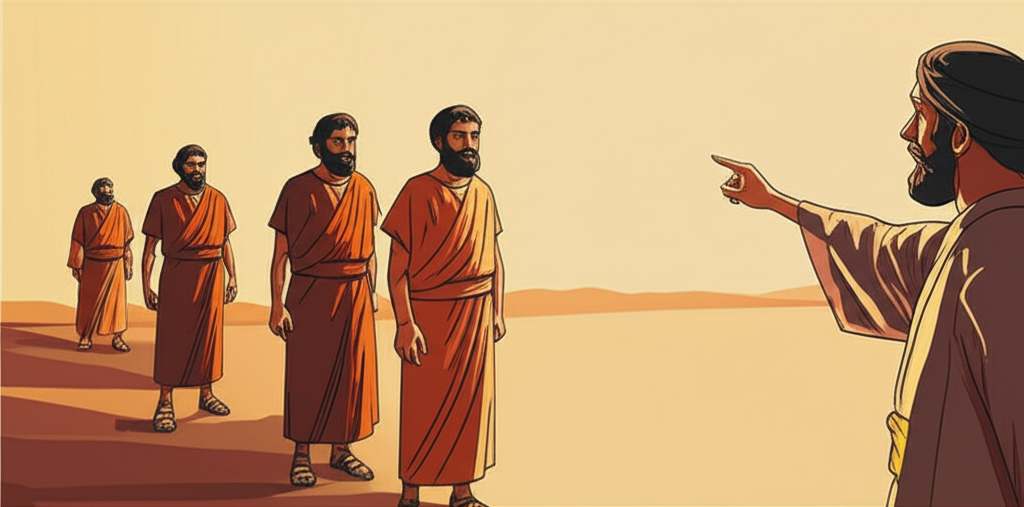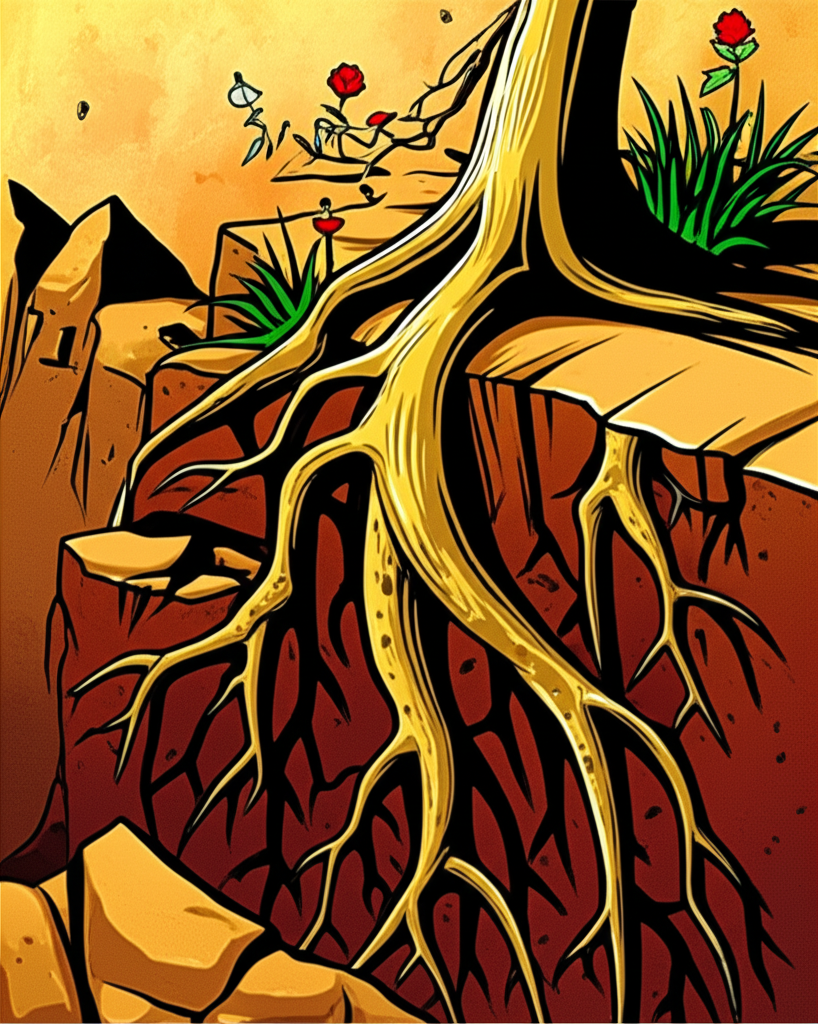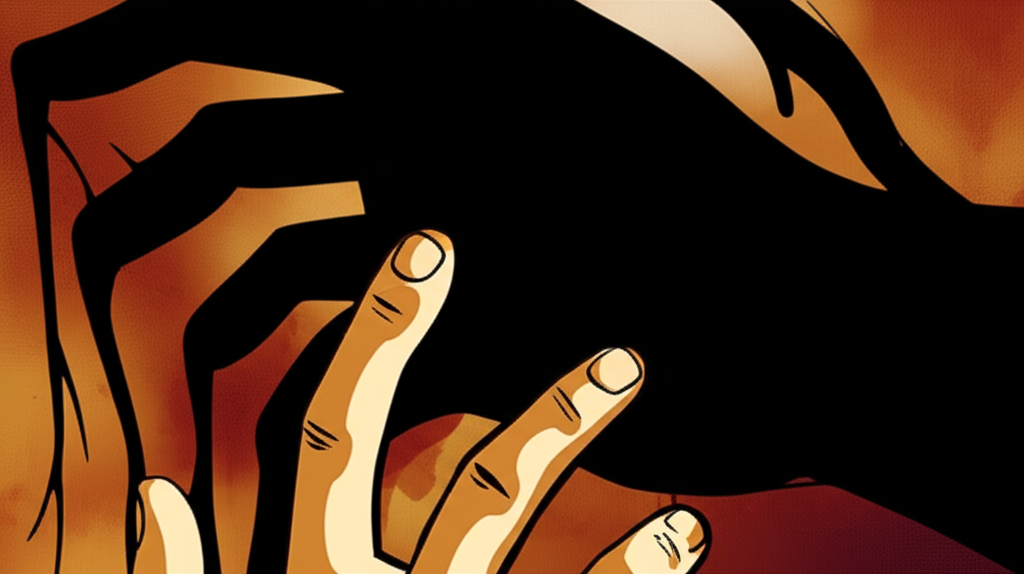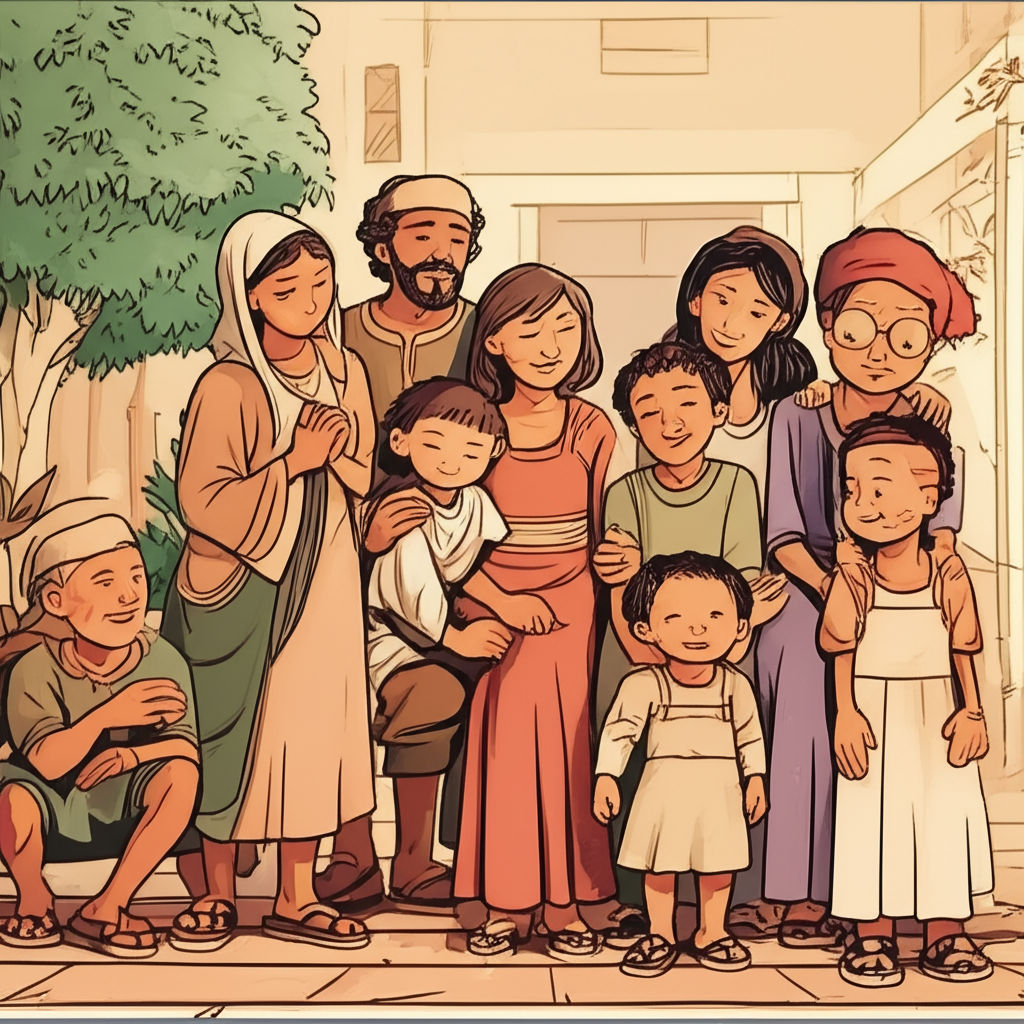Job 8 meaning explained in AI Summary
In Job chapter 8, Bildad the Shuhite becomes the second of Job's friends to offer his perspective on Job's suffering. Unlike Eliphaz who approached with a gentler tone, Bildad is much harsher and more direct in his accusations. of his argument:
- Bildad's Premise (8:1-7): He begins by questioning Job's outburst and implying that God is just and wouldn't punish the innocent. He argues that if Job were truly blameless, God would restore his fortunes. He reminds Job of God's power and justice, suggesting that Job's children must have sinned to deserve their fate.
- Bildad's "Wisdom" (8:8-19): Bildad appeals to the wisdom of past generations, claiming that suffering is always a consequence of sin. He uses metaphors of a fading plant and a spider's web to illustrate the fleeting nature of the wicked and their prosperity. He insists that the wicked will be uprooted and forgotten.
- Bildad's "Solution" (8:20-22): Bildad concludes by urging Job to repent and seek God's favor. He assures Job that if he is truly repentant, God will forgive him and restore his blessings. He paints a picture of a bright future if Job chooses this path.
Essentially, Bildad's argument boils down to this:
- You are suffering, therefore you must have sinned.
- Repent, and God will forgive and restore you.
Key Points:
- Bildad's speech is marked by a strong belief in retribution theology – the idea that suffering is a direct consequence of sin.
- He shows little empathy for Job's pain and instead focuses on proving his guilt.
- His words, though presented as wisdom, lack true understanding of Job's situation and God's character.
Chapter 8 sets the stage for the ongoing debate between Job and his friends, highlighting the limitations of human wisdom in the face of profound suffering.
Job 8 bible study ai commentary
Bildad's speech presents a rigid and traditionalist view of divine retributive justice. He dismisses Job’s anguished cries as meaningless wind and posits a simple, unwavering formula: God is just; therefore, suffering is a direct consequence of sin, and righteousness leads to prosperity. He urges Job to repent to be restored, drawing on the wisdom of ancestors and nature analogies to illustrate the inevitable downfall of the wicked and the conditional hope for the righteous. The chapter serves as a stark example of a well-intentioned but flawed theology that fails to account for the mystery of suffering and the sovereignty of God.
Job 8 Context
This is the first speech from Bildad the Shuhite, the second of Job's three friends. Coming after Job's profound despair in chapter 7, Bildad's response lacks empathy. Instead of comfort, he offers a legalistic and traditional argument rooted in the wisdom of "former generations." His approach contrasts with Eliphaz's, which was based on a personal spiritual vision. Bildad represents established, orthodox belief, which holds that the observable world operates on a strict moral cause-and-effect principle governed by a just God. This perspective, common in Ancient Near Eastern wisdom, is precisely what the Book of Job challenges.
Job 8:1-3
Then Bildad the Shuhite answered and said: “How long will you say these things, and the words of your mouth be a great wind? Does God pervert justice? Or does the Almighty pervert the right?”
In-depth-analysis
- A Rebuke, Not Comfort: Bildad opens with harshness, dismissing Job's deep laments ("how long") as empty talk, a "great wind" (
ruach kabir), implying they are powerful but ultimately meaningless and unsubstantial. - The Foundational Premise: Verse 3 is the theological foundation of all three friends' arguments. Bildad poses a rhetorical question, expecting the answer "No!" God (
'El) and the Almighty (Shaddai) cannot be unjust. - The Flawed Application: While the premise that God is perfectly just is a core biblical truth, Bildad's error is his application. He assumes that a human being can correctly interpret all circumstances (like Job's suffering) and work backward to deduce God's judgment and its cause. He locks God's justice into a system that must be immediately visible and understandable to man.
Bible references
- Genesis 18:25: "...Shall not the Judge of all the earth do what is just?” (Abraham's plea for Sodom, affirming God's justice).
- Deuteronomy 32:4: "The Rock, his work is perfect, for all his ways are justice. A God of faithfulness and without iniquity, just and upright is he." (Reinforces Bildad's core premise about God).
- Romans 9:14: "What shall we say then? Is there injustice on God's part? By no means!" (Paul addresses the same foundational question in the context of God's sovereign choice).
- Psalm 92:15: "to declare that the LORD is upright; he is my rock, and there is no unrighteousness in him." (Affirms the core truth Bildad starts with).
Cross references
Dan 9:14 (The Lord is righteous), 2 Chr 19:7 (no injustice with God), Ps 11:7 (The Lord is righteous, he loves righteous deeds), Rom 2:11 (God shows no partiality).
Job 8:4-7
If your children have sinned against him, he has delivered them into the hand of their transgression. If you will seek God and plead with the Almighty for mercy, if you are pure and upright, surely then he will rouse himself for you and restore your rightful habitation. And though your beginning was small, your latter end will be very great.
In-depth-analysis
- Brutal Accusation: In verse 4, Bildad offers the cruelest explanation for the death of Job’s children: it was their own fault. He claims God simply "delivered them into the hand of their transgression," a coldly clinical way of saying they got what they deserved. This directly contradicts the prologue's testimony of Job's meticulous piety on their behalf (Job 1:5).
- A Conditional Formula: He lays out a simple, conditional path to recovery:
- Seek God earnestly: The Hebrew for "seek" is
shachar, which also means "dawn." It implies an urgent, early-morning seeking. - Be Pure and Upright: This is the condition for restoration, but Bildad assumes Job is currently neither.
- Seek God earnestly: The Hebrew for "seek" is
- Promise of Restoration: The reward for repentance is twofold: God will "rouse himself" (wake up to act) and restore Job's "rightful habitation," implying his current state is not rightful. The promise that the "latter end will be very great" is a tenet of wisdom literature, but offered here as a direct consequence of a transactional repentance.
Bible references
- Job 42:12-13: "And the LORD blessed the latter days of Job more than his beginning... He had also seven sons and three daughters." (This prophecy ironically comes true, but not because of Bildad's formulaic theology, but through Job's submission to God's sovereign mystery).
- Luke 13:4-5: "...those eighteen on whom the tower in Siloam fell and killed them: do you think that they were worse offenders... No, I tell you; but unless you repent, you will all likewise perish." (Jesus directly refutes the idea that catastrophic death is proof of greater sin).
- Isaiah 55:6-7: "Seek the LORD while he may be found... let him return to the LORD, that he may have compassion on him..." (A true call to repentance, based on God's compassion, not just a transactional formula).
- Jeremiah 29:13: "You will seek me and find me, when you seek me with all your heart." (The emphasis on the heart contrasts with Bildad's more mechanical view).
Cross references
Deut 4:29 (seeking and finding God), Prov 14:11 (the tent of the upright will flourish), 2 Chr 7:14 (if my people humble themselves... and seek my face...), Ps 37:35-36 (the wicked suddenly gone).
Job 8:8-10
For inquire, please, of the former generation, and pay attention to the findings of their fathers. For we are but of yesterday and know nothing, for our days on earth are a shadow. Will they not teach you and tell you and utter words out of their heart?
In-depth-analysis
- Appeal to Tradition: Bildad dismisses Job's personal experience and appeals to a higher authority: ancestral wisdom. His argument is that the collective, time-tested knowledge of "the former generation" is superior to the fleeting, ignorant perspective of the present ("we are but of yesterday").
- Human Brevity: The statement "our days on earth are a shadow" (
tsel) emphasizes human transience and limited understanding, arguing that only wisdom accumulated over centuries is reliable. - Polemics: This is a polemic against individual, existential cries for understanding. Bildad trusts the established system and tradition over the raw data of lived suffering. The Bible values tradition (2 Tim 1:13-14), but never as an unthinking replacement for a personal relationship with God or as a tool to silence the suffering.
Bible references
- Psalm 39:5: "Behold, you have made my days a few handbreadths, and my lifetime is as nothing before you. Surely all mankind stands as a mere breath!" (Echoes the theme of human brevity).
- Psalm 144:4: "Man is like a breath; his days are like a passing shadow." (Direct parallel to "our days on earth are a shadow").
- Deuteronomy 4:32: "For ask now of the days that are past, which were before you... and ask from one end of heaven to the other..." (Moses also encourages looking to the past, but to remember God's specific redemptive acts, not just to find general moral maxims).
- 1 Chronicles 29:15: "For we are... sojourners, as all our fathers were. Our days on the earth are like a shadow, and there is no abiding." (David's prayer, sharing the same imagery of life as a shadow).
Cross references
Deut 32:7 (remember the days of old), Ps 78:3-4 (what we have heard from our fathers), Heb 11:13 (strangers and exiles on the earth).
Job 8:11-13
Can papyrus (
gome') grow where there is no marsh? Can reeds (achu) flourish where there is no water? While yet in flower and not cut down, they wither before any other plant. Such are the paths of all who forget God; the hope of the godless (chanef) shall perish.
In-depth-analysis
- Nature Analogy 1: The Water Plants: Bildad uses the image of papyrus and reeds, plants known for their lush, green appearance but their absolute dependence on water.
- Superficial Strength: Their weakness is that they "wither before any other plant" the moment their water source is gone. This is a powerful metaphor for the wicked person, whose prosperity seems vibrant but is superficial and utterly dependent on favorable circumstances.
- Forgetting God: Bildad equates "forgetting God" with the water source being cut off. For him, a relationship with God is a pragmatic utility for ensuring one's life doesn't wither. The hope (
tiqvah) of the godless (chanef- polluted, profane) is as fleeting as these plants.
Bible references
- Psalm 1:3-4: "He is like a tree planted by streams of water... In all that he does, he prospers. The wicked are not so, but are like chaff that the wind drives away." (The classic contrast between the righteous, who have a constant source, and the wicked who do not).
- James 1:10-11: "...the rich man will pass away like a flower of the field... the sun rises with its scorching heat and withers the grass; its flower falls, and its beauty perishes. So also will the rich man fade away..." (The New Testament using the same imagery for fleeting prosperity).
- 1 Peter 1:24: "for 'All flesh is like grass and all its glory like the flower of grass. The grass withers, and the flower falls...'" (Quoting Isaiah, this theme permeates Scripture).
- Psalm 37:2: "For they will soon fade like the grass and wither like the green herb." (A direct parallel to the swift withering).
Cross references
Ps 129:6 (like grass on the housetops), Isa 40:6-8 (all flesh is grass), Matt 13:6 (plants with no root withered away), John 15:6 (if anyone does not abide in me he is...withered).
Job 8:14-19
His confidence is severed, and his trust is a spider's web. He leans against his house, but it does not stand; he lays hold of it, but it does not endure. He is a lush plant in the sun, whose shoots spread over his garden. His roots entwine the stone heap; he looks upon a house of stones. But when he is swallowed up from his place, it will deny him, saying, ‘I have never seen you.’ Behold, this is the joy of his way, and out of the soil others will spring.
In-depth-analysis
- Nature Analogy 2: The Spider's Web: The wicked person’s trust (
mibtacho) is a spider’s web (beitakkabish`). It is intricately built and looks like a home, but it has no substance and offers no real security. It cannot support any weight. - Nature Analogy 3: The Uprooted Plant: Bildad shifts to a plant that seems incredibly robust—so strong its roots entwine rocks. Yet, it can be "swallowed up" (violently removed) so completely that its very place "will deny him." This speaks to the sudden and total annihilation of the wicked.
- Sarcastic Conclusion: "Behold, this is the joy of his way" is dripping with sarcasm. The "joy" of the wicked is this complete and utter destruction and being forgotten. Others simply sprout up to replace him, showing his ultimate insignificance.
Bible references
- Isaiah 59:5-6: "They hatch adders' eggs and weave the spider's web... Their webs will not serve as clothing; men will not cover themselves with what they make." (The spider's web used as a symbol of useless and evil works).
- Matthew 7:26-27: "And everyone who hears these words of mine and does not do them will be like a foolish man who built his house on the sand. And the rain fell... and it fell, and great was the fall of it." (The theme of a faulty foundation and a house that cannot endure).
- Matthew 15:13: "He answered, 'Every plant that my heavenly Father has not planted will be rooted up.'" (Jesus uses the same metaphor of uprooting for that which is not of God).
- Psalm 37:10: "In just a little while, the wicked will be no more; though you look carefully at his place, he will not be there." (The theme of the wicked vanishing completely).
Cross references
Prov 10:28 (the hope of the righteous brings joy), Prov 11:7 (when the wicked die their hope perishes), Ps 103:16 (the wind passes over it, and it is gone), Ecc 2:16 (the wise and fool are forgotten).
Job 8:20-22
Behold, God will not reject a blameless man, nor will he give strength to the hand of evildoers. He will yet fill your mouth with laughter, and your lips with shouting. Those who hate you will be clothed with shame, and the tent of the wicked will be no more.”
In-depth-analysis
- The Final Summary: Bildad concludes by restating his core principle: God does not reject the "blameless" (
tam- the exact same Hebrew word used to describe Job in 1:1 and 1:8!) or help evildoers. - Dramatic Irony: The use of
tamcreates intense dramatic irony. Bildad is unwittingly stating a truth that undermines his entire argument. Because the audience knows Job is blameless, Bildad's statement should lead to the conclusion that Job's suffering is a mystery, not a punishment. Instead, Bildad uses it as a final test for Job. - A Conditional Hope: The promise of laughter and joy is conditional. "He will yet fill your mouth with laughter" implies that it will only happen if Job aligns with the blameless category, which Bildad clearly believes he has left.
- Vindication and Destruction: The end is a stark binary: vindication for the righteous (shame for their enemies) and utter annihilation for the wicked (their "tent... will be no more").
Bible references
- Job 1:1: "There was a man in the land of Uz whose name was Job, and that man was blameless (
tam) and upright..." (The key word that reveals the flaw in Bildad's argument). - Psalm 126:2: "Then our mouth was filled with laughter, and our tongue with shouts of joy..." (Laughter as the result of God's great restoration).
- Psalm 37:25: "I have been young, and now am old, yet I have not seen the righteous forsaken or his children begging for bread." (The Psalmist's observation, which represents the traditional wisdom Bildad champions).
- Proverbs 10:25: "When the tempest passes, the wicked is no more, but the righteous is established forever." (Summarizes the two fates described in v. 22).
Cross references
Ps 9:18 (the needy will not always be forgotten), Ps 34:15-16 (the eyes of the Lord are on the righteous), Ps 132:18 (His enemies I will clothe with shame), Gen 21:6 (Sarah's laughter from God).
Job chapter 8 analysis
- The Problem of Partial Truth: Bildad's theology isn't entirely false; it's dangerously incomplete. God is just (Deut 32:4). The wicked do ultimately perish (Ps 37). But these truths become falsehoods when applied as a rigid, universal, and immediately observable law, ignoring the profound realities of God's sovereignty, testing, satanic opposition, and righteous suffering.
- The Danger of "Tidy" Theology: Bildad represents a theological system with no room for mystery or paradox. He has an answer for everything, and his system must be defended even at the cost of compassion. The book of Job argues that a true relationship with God requires trusting Him even when His actions don't fit our theological boxes.
- Irony of God's True Restoration: As the book concludes in chapter 42, God does indeed restore Job's fortunes, and his latter end is greater than the beginning (Job 42:12). However, this happens after God rebukes Bildad and his friends for "not speak[ing] of me what is right, as my servant Job has" (Job 42:7). The restoration validates God's sovereign grace, not Bildad's formula.
- Wisdom Literature as a Dialogue: Bildad’s speech shouldn't be read in isolation as "biblical teaching." It represents one perspective in a much larger debate. It is a perfect foil, setting up the profound critique of simplistic answers that the rest of the book, and God's own speech, will provide. Jesus' teachings in Luke 13 (the tower of Siloam) and John 9 (the man born blind) are the ultimate refutation of Bildad's theology.
Job 8 summary
Bildad delivers a harsh and unsympathetic speech based on traditional wisdom. He accuses Job's children of dying for their own sins and insists that Job’s suffering proves his guilt. Asserting that a just God would never punish the innocent, he presents Job with a simple choice: repent and be "pure and upright" to have God restore his health and wealth to be greater than before, or remain in sin and wither away like a reed without water or a spider's web. His entire argument is an application of a rigid formula of retributive justice that fails to see the truth of Job's situation.
Job 8 AI Image Audio and Video










Job chapter 8 kjv
- 1 Then answered Bildad the Shuhite, and said,
- 2 How long wilt thou speak these things? and how long shall the words of thy mouth be like a strong wind?
- 3 Doth God pervert judgment? or doth the Almighty pervert justice?
- 4 If thy children have sinned against him, and he have cast them away for their transgression;
- 5 If thou wouldest seek unto God betimes, and make thy supplication to the Almighty;
- 6 If thou wert pure and upright; surely now he would awake for thee, and make the habitation of thy righteousness prosperous.
- 7 Though thy beginning was small, yet thy latter end should greatly increase.
- 8 For enquire, I pray thee, of the former age, and prepare thyself to the search of their fathers:
- 9 (For we are but of yesterday, and know nothing, because our days upon earth are a shadow:)
- 10 Shall not they teach thee, and tell thee, and utter words out of their heart?
- 11 Can the rush grow up without mire? can the flag grow without water?
- 12 Whilst it is yet in his greenness, and not cut down, it withereth before any other herb.
- 13 So are the paths of all that forget God; and the hypocrite's hope shall perish:
- 14 Whose hope shall be cut off, and whose trust shall be a spider's web.
- 15 He shall lean upon his house, but it shall not stand: he shall hold it fast, but it shall not endure.
- 16 He is green before the sun, and his branch shooteth forth in his garden.
- 17 His roots are wrapped about the heap, and seeth the place of stones.
- 18 If he destroy him from his place, then it shall deny him, saying, I have not seen thee.
- 19 Behold, this is the joy of his way, and out of the earth shall others grow.
- 20 Behold, God will not cast away a perfect man, neither will he help the evil doers:
- 21 Till he fill thy mouth with laughing, and thy lips with rejoicing.
- 22 They that hate thee shall be clothed with shame; and the dwelling place of the wicked shall come to nought.
Job chapter 8 nkjv
- 1 Then Bildad the Shuhite answered and said:
- 2 "How long will you speak these things, And the words of your mouth be like a strong wind?
- 3 Does God subvert judgment? Or does the Almighty pervert justice?
- 4 If your sons have sinned against Him, He has cast them away for their transgression.
- 5 If you would earnestly seek God And make your supplication to the Almighty,
- 6 If you were pure and upright, Surely now He would awake for you, And prosper your rightful dwelling place.
- 7 Though your beginning was small, Yet your latter end would increase abundantly.
- 8 "For inquire, please, of the former age, And consider the things discovered by their fathers;
- 9 For we were born yesterday, and know nothing, Because our days on earth are a shadow.
- 10 Will they not teach you and tell you, And utter words from their heart?
- 11 "Can the papyrus grow up without a marsh? Can the reeds flourish without water?
- 12 While it is yet green and not cut down, It withers before any other plant.
- 13 So are the paths of all who forget God; And the hope of the hypocrite shall perish,
- 14 Whose confidence shall be cut off, And whose trust is a spider's web.
- 15 He leans on his house, but it does not stand. He holds it fast, but it does not endure.
- 16 He grows green in the sun, And his branches spread out in his garden.
- 17 His roots wrap around the rock heap, And look for a place in the stones.
- 18 If he is destroyed from his place, Then it will deny him, saying, 'I have not seen you.'
- 19 "Behold, this is the joy of His way, And out of the earth others will grow.
- 20 Behold, God will not cast away the blameless, Nor will He uphold the evildoers.
- 21 He will yet fill your mouth with laughing, And your lips with rejoicing.
- 22 Those who hate you will be clothed with shame, And the dwelling place of the wicked will come to nothing."
Job chapter 8 niv
- 1 Then Bildad the Shuhite replied:
- 2 "How long will you say such things? Your words are a blustering wind.
- 3 Does God pervert justice? Does the Almighty pervert what is right?
- 4 When your children sinned against him, he gave them over to the penalty of their sin.
- 5 But if you will seek God earnestly and plead with the Almighty,
- 6 if you are pure and upright, even now he will rouse himself on your behalf and restore you to your prosperous state.
- 7 Your beginnings will seem humble, so prosperous will your future be.
- 8 "Ask the former generation and find out what their ancestors learned,
- 9 for we were born only yesterday and know nothing, and our days on earth are but a shadow.
- 10 Will they not instruct you and tell you? Will they not bring forth words from their understanding?
- 11 Can papyrus grow tall where there is no marsh? Can reeds thrive without water?
- 12 While still growing and uncut, they wither more quickly than grass.
- 13 Such is the destiny of all who forget God; so perishes the hope of the godless.
- 14 What they trust in is fragile; what they rely on is a spider's web.
- 15 They lean on the web, but it gives way; they cling to it, but it does not hold.
- 16 They are like a well-watered plant in the sunshine, spreading its shoots over the garden;
- 17 it entwines its roots around a pile of rocks and looks for a place among the stones.
- 18 But when it is torn from its spot, that place disowns it and says, 'I never saw you.'
- 19 Surely its life withers away, and from the soil other plants grow.
- 20 "Surely God does not reject one who is blameless or strengthen the hands of evildoers.
- 21 He will yet fill your mouth with laughter and your lips with shouts of joy.
- 22 Your enemies will be clothed in shame, and the tents of the wicked will be no more."
Job chapter 8 esv
- 1 Then Bildad the Shuhite answered and said:
- 2 "How long will you say these things, and the words of your mouth be a great wind?
- 3 Does God pervert justice? Or does the Almighty pervert the right?
- 4 If your children have sinned against him, he has delivered them into the hand of their transgression.
- 5 If you will seek God and plead with the Almighty for mercy,
- 6 if you are pure and upright, surely then he will rouse himself for you and restore your rightful habitation.
- 7 And though your beginning was small, your latter days will be very great.
- 8 "For inquire, please, of bygone ages, and consider what the fathers have searched out.
- 9 For we are but of yesterday and know nothing, for our days on earth are a shadow.
- 10 Will they not teach you and tell you and utter words out of their understanding?
- 11 "Can papyrus grow where there is no marsh? Can reeds flourish where there is no water?
- 12 While yet in flower and not cut down, they wither before any other plant.
- 13 Such are the paths of all who forget God; the hope of the godless shall perish.
- 14 His confidence is severed, and his trust is a spider's web.
- 15 He leans against his house, but it does not stand; he lays hold of it, but it does not endure.
- 16 He is a lush plant before the sun, and his shoots spread over his garden.
- 17 His roots entwine the stone heap; he looks upon a house of stones.
- 18 If he is destroyed from his place, then it will deny him, saying, 'I have never seen you.'
- 19 Behold, this is the joy of his way, and out of the soil others will spring.
- 20 "Behold, God will not reject a blameless man, nor take the hand of evildoers.
- 21 He will yet fill your mouth with laughter, and your lips with shouting.
- 22 Those who hate you will be clothed with shame, and the tent of the wicked will be no more."
Job chapter 8 nlt
- 1 Then Bildad the Shuhite replied to Job:
- 2 "How long will you go on like this?
You sound like a blustering wind. - 3 Does God twist justice?
Does the Almighty twist what is right? - 4 Your children must have sinned against him,
so their punishment was well deserved. - 5 But if you pray to God
and seek the favor of the Almighty, - 6 and if you are pure and live with integrity,
he will surely rise up and restore your happy home. - 7 And though you started with little,
you will end with much. - 8 "Just ask the previous generation.
Pay attention to the experience of our ancestors. - 9 For we were born but yesterday and know nothing.
Our days on earth are as fleeting as a shadow. - 10 But those who came before us will teach you.
They will teach you the wisdom of old. - 11 "Can papyrus reeds grow tall without a marsh?
Can marsh grass flourish without water? - 12 While they are still flowering, not ready to be cut,
they begin to wither more quickly than grass. - 13 The same happens to all who forget God.
The hopes of the godless evaporate. - 14 Their confidence hangs by a thread.
They are leaning on a spider's web. - 15 They cling to their home for security, but it won't last.
They try to hold it tight, but it will not endure. - 16 The godless seem like a lush plant growing in the sunshine,
its branches spreading across the garden. - 17 Its roots grow down through a pile of stones;
it takes hold on a bed of rocks. - 18 But when it is uprooted,
it's as though it never existed! - 19 That's the end of its life,
and others spring up from the earth to replace it. - 20 "But look, God will not reject a person of integrity,
nor will he lend a hand to the wicked. - 21 He will once again fill your mouth with laughter
and your lips with shouts of joy. - 22 Those who hate you will be clothed with shame,
and the home of the wicked will be destroyed."
- Bible Book of Job
- 1 Story of Job
- 2 Satan Attacks Job's Health
- 3 Job Laments His Birth
- 4 Eliphaz Speaks: The Innocent Prosper
- 5 Call now; is there anyone who will answer you? To which of the holy ones will
- 6 Job Replies: My Complaint Is Just
- 7 Job Continues: My Life Has No Hope
- 8 Bildad Speaks: Job Should Repent
- 9 Job Replies: There Is No Arbiter
- 10 Job Continues: A Plea to God
- 11 Zophar Speaks: You Deserve Worse
- 12 Job Replies: The Lord Has Done This
- 13 Job Continues: Still I Will Hope in God
- 14 Job Continues: Death Comes Soon to All
- 15 Eliphaz Accuses: Job Does Not Fear God
- 16 Job Replies: Miserable Comforters Are You
- 17 Job Continues: Where Then Is My Hope?
- 18 Bildad Speaks: God Punishes the Wicked
- 19 Job Replies: My Redeemer Lives
- 20 Zophar Speaks: The Wicked Will Suffer
- 21 Job Replies: The Wicked Do Prosper
- 22 Eliphaz Speaks: Job's Wickedness Is Great
- 23 Job Replies: Where Is God?
- 24 Why are not times of judgment kept by the Almighty, and why do those who know
- 25 Bildad Speaks: Man Cannot Be Righteous
- 26 Job Replies: God's Majesty Is Unsearchable
- 27 Job Continues: I Will Maintain My Integrity
- 28 Job Continues: Where Is Wisdom?
- 29 Job's Summary Defense
- 30 But now they laugh at me, men who are younger than I, whose fathers I would
- 31 Covenant with my Eyes
- 32 Elihu Rebukes Job's Three Friends
- 33 Elihu Rebukes Job
- 34 Elihu Asserts God's Justice
- 35 Elihu Condemns Job
- 36 Elihu Extols God's Greatness
- 37 Elihu Proclaims God's Majesty
- 38 Job questions God
- 39 Do you know when the mountain goats give birth? Do you observe the calving of
- 40 Job Promises Silence
- 41 Lord's challenge of Leviathan
- 42 Job's Repentance and Restoration